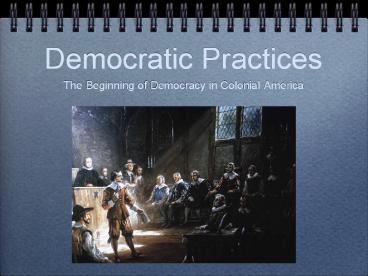Democratic Practices - PowerPoint PPT Presentation
1 / 17
Title:
Democratic Practices
Description:
Title: Democratic Practices Last modified by: Technology Dept Document presentation format: On-screen Show Other titles: Bradley Hand ITC TT-Bold Stone Sans ITC TT ... – PowerPoint PPT presentation
Number of Views:140
Avg rating:3.0/5.0
Title: Democratic Practices
1
Democratic Practices
- The Beginning of Democracy in Colonial America
2
I. The Beginning of Self-Government
- A. In 1619, the Virginia Company sent a governor
to Jamestown to rule the colony.
3
- B. The colonists were also given a voice in
running the colonys government. - 1. Thus, the first form of representative
government began in the English colonies.
4
- C. Adult freemen could elect representatives, or
burgesses, to a lawmaking body, the House of
Burgesses. - 1. Could make laws to govern the colony, but the
governor could refuse to approve them
5
II. The Mayflower Compact
- A. The Pilgrims were granted a charter to set up
a colony in Virginia. - 1. However, they landed in Massachusetts, so they
were outside the area of their charter and its
laws.
6
- 2. To establish some kind of law and discipline,
Pilgrim leaders decided that they must make an
agreement before they went ashore. - B. The 41 men aboard signed a document setting up
a form of self-government and agreeing to obey
laws passed by the majority.
7
- C. This agreement became known as the Mayflower
Compact.
8
III. The General Court
- A. The Puritans in the Massachusetts Bay Colony
created the General Court, which made the laws.
9
- B. At first, it only included Puritans, but later
included all adult freemen, as long as they were
members of the church.
10
- C. The General Courts laws represented the
Puritan way of thinking - 1. everyone had to attend long Sunday church
services. - 2. Dancing and games were strictly forbidden.
11
IV. Fundamental Orders of Connecticut
- A. Thomas Hooker and other town leaders created
the Fundamental Orders of Connecticut.
12
- 1. This document was the first American
constitution, or plan of government to be
written. - 2. It provided for an assembly and an elected
governor. - 3. Under this constitution, all men who owned
property could vote.
13
V. Town Meetings
- A. In New England communities, at the yearly town
meeting, all the free men of the town discussed
issues. - 1. Town meetings were limited at first to land
owning church members but later included all
white male property owners
14
- B. Although not every community member could
vote, town meetings were an important step toward
democracy. - 1. Thomas Jefferson called them the wisest
invention ever devised by the wit of man for the
perfect exercise of self-government and for its
preservation.
15
VI. Rights of Colonists
- A. King James II abolished colonial
representative governments for while, but
eventually were restored.
16
- B. The colonists were proud of the rights they
had as English citizens. These rights included - 1. Right to a fair trial by jury.
- 2. Right to be taxed by lawmakers elected by the
people.
17
- C. However, women could not vote, and neither
could indentured servants, slaves, and Native
Americans.































